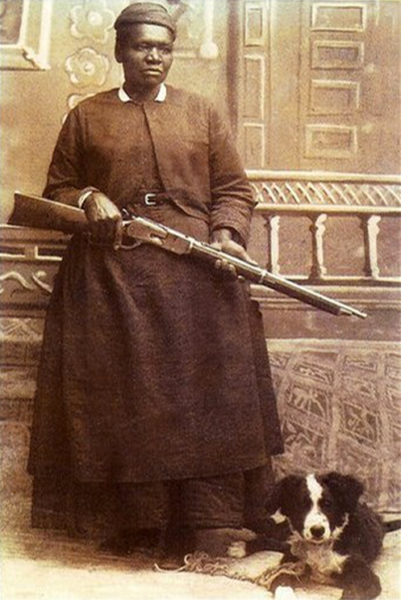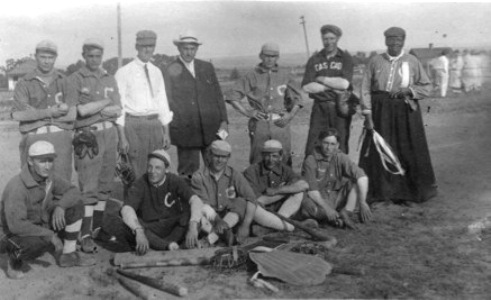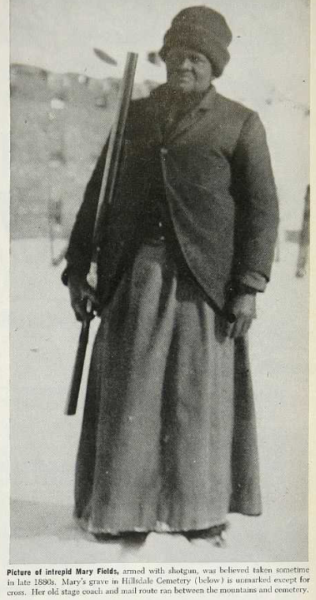My head has been full of the myriad of terrible stuff in our world; stuff that is not new, but that Covid-19 has placed a magnifying glass over and lit fire to stress and hardships that had been slowly baking under the surface of our everyday USA. And I have been wanting to celebrate something good, because there are still good things out there and good people. We cannot turn away from the terrible stuff, we cannot pretend it is not there, but we can show it something better.
Today, I am celebrating Mary Fields: a pioneer, a mail carrier, a woman, and an African American.

Mary Fields, author unknown 
Mary Fields and the Cascade baseball team. Photo courtesy Wedsworth Memorial Library, Cascade, Montana 
As pictured in Cooper, Gary & Crawford, Marc. (1959) Stage Coach Mary: Gun-toting Montanan delivered U.S. mail. Ebony magazine. October 1st
I am not original when declaring that there is something fascinating about the wild west. In my youth, I became obsessed with stories of western pioneers and nere-do-wells after reading Doc Holiday by John Myers Myers. What I didn’t find a lot of in those stories were women or African Americans. Rodger Hardaway, a scholar working in the niche field focusing on African American Women in the west postulates that the small percentage of African Americans out west, and even smaller percentage of women to men leads to a lack of historical treatment. I’d postulate that the prejudices that keep our history books full of white men might have something to do with it as well.
Mary Fields was an independent and powerful woman. Born before the Civil War, she was enslaved to the Warren family in either West Virginia or Arkansas. After emancipation Mary Fields took chamber maid and laundress jobs on steam ships traveling up the Mississippi. It was on the river that she met Judge Dunne, according to one source (Hanshew, 2014). Other sources say Fields first made acquaintance with the Dunne family when one of the Warner family’s daughters married a Dunne (Reindle, 2010). However they met, Fields would take a position among the Dunne family household staff.
When Judge Dunne’s wife died, Mary Fields took his five children to his sister, Mother Mary Amadeus, at the Ursuline convent in Toledo Ohio (Wikipedia). Mother Mary Amadeus asked her to stay and work for the convent. There, Fields earned herself a reputation for being hard working, argumentative, and loyal. She enjoyed a good drink, a cigar, and took to wearing men’s jackets and boots. Field’s employment at the convent in Toledo seems to have been a comfortable arrangement even though the girls at the convent school were reportedly afraid of her wrath should they tread on her freshly cut lawn. Fields only left when Mother Amadeus, who had been sent to Montana to establish a mission, fell ill with pneumonia.
Fields nursed her friend back to health in Montana and then took on many of the same duties at St. Peter’s Mission that she had carried out in Toledo, though possibly without pay. Fields’ happy arrangement with the nuns of St. Peter’s came to an end when Fields and a hired man drew guns on each other in a dispute. This was the last straw for the bishop who had already heard stories of her cussing, drinking, smoking, and wearing men’s clothing. He ordered her to be dismissed from the convent.
Possibly with the help of Mother Amadeus, Fields set herself up in nearby Cascade and opened a restaurant that quickly folded due to her not charging cash strapped patrons. After doing sundry odd jobs Mary Fields won a Star Route contract with the US Post Office because she was the fastest applicant to hitch a team of six horses (Wikipedia). She was only the second woman to be employed as a carrier by the postal service and the first African American woman.
Already in her sixties, Fields would carry the mail between the Cascade train depot and St. Peter’s Mission for two four-year contracts. She acquired the nickname “Stagecoach” Mary for her reliability. She never missed a day. When the snow was too deep to pull the stagecoach through, she donned snow shoes and carried the mail herself. When the coach was overturned she paced in the cold to keep from freezing, and protected her cargo, horses, and mule from roaming wolves. Fields embodied the mission of the post office. She traveled through rain, sleet, and snow to deliver precious supplies and communication. The internet has made it easy today to overlook the great history and service of the US Post Office even as it supplies us in this pandemic and looks toward an uncertain future (Murse, 2020).
While carrying the mail, Fields became so beloved by the people of Cascade that they rebuilt the laundry service she started in retirement after it burned to the ground. She also ate for free at the local restaurant, and was given a special dispensation by the Mayor to drink in the saloons when women were no longer allowed to do so. Gary Cooper, also of Cascade, remembered her fondly in a piece he related for Ebony magazine in 1959. Cooper told of how she babysat most of the children in town, spending most of her earnings from childcare on candy and treats for the children. She was made the mascot of the baseball team for her tireless devotion and providing bouquets and boutonnieres to the star players from her own garden.
Stories of her exploits, like punching a man down in the street who had not paid his laundry bill, paint a picture of a woman who was larger than life. She was also six feet tall and, according to some, over 200 pounds. But I wonder if just under the surface is the story of a lonely woman as well. Fields never married, she socialized with men, and was the only African American in Cascade. As pointed out by her autobiographer, a subtle racism could have made her an outsider even as she was embraced by the people of Cascade (Hanshew, 2014). Fields left no written record of her own view point, so we may never know the personal thoughts and feelings of this legendary woman.
The archivist at the Ursuline Convent in Toledo mentioned that most inquiries about Mary Fields happen around Black History Month (Reindl, 2010) and the dates on many of the articles I found corroborated this. It’s sad that we restrict our appreciation of underrepresented citizens to one month a year. I say that this month is African American History Month and every month should be African American History Month; every month should be Women’s History Month; every month LGBTQ+ History Month; every month Native American Heritage Month. After all, our history books have taught us that every month has always been White History Month, yes?
References
- Amspacher, Shelby (2020) Stagecoach Mary Fields. Smithsonian National Postal Museum. blog. https://postalmuseum.si.edu/stagecoach-mary-fields
- Blakemore, Erin. (2019) Meet Stagecoach Mary, the Daring Black Pioneer Who Protected Wild West Stagecoaches. History Stories. History.com. https://www.history.com/news/meet-stagecoach-mary-the-daring-black-pioneer-who-protected-wild-west-stagecoaches
- Cooper, Gary as told to Marc Crawford (1959) Stage Coach Mary: Gun-toting Montanan delivered U.S. mail. Ebony magazine. October 1st.
- Hanshew, Annie (2014) The Life and Legend of Mary Fields (2014) Women’s History Matters. http://montanawomenshistory.org/the-life-and-legend-of-mary-fields/.
- Hardaway, Rodger D. “AFRICAN-AMERICAN WOMEN ON THE WESTERN FRONTIER.” Negro History Bulletin, vol. 60, no. 1, Jan. 1997, pp. 11–12., www.jstor.org/stable/24766796.
- Mary Fields (2020) Wikipedia. https://en.wikipedia.org/wiki/Mary_Fields
- Murse, Tom (2020) Why Does the US Postal Service Lose Money? ThoughtCo. April 4. https://www.thoughtco.com/postal-service-losses-by-year-3321043
- Pickett, Mary. “’Stagecoach Mary’ Cuts Colorful Swath.” The Billings Gazette, 8 Feb. 2009, www.billingsgazette.com/news/features/magazine/stagecoach-mary-cuts-colo…
- Reindl, JC. “’Stagecoach Mary’ Broke Barriers of Race, Gender.” Toledo Blade, 8 Feb. 2010,https://www.toledoblade.com/local/2010/02/08/Stagecoach-Mary-broke-barriers-of-race-gender.html
